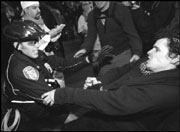IS DRIVING WHILE black a criminal offense in Seattle? African Americans from all walks of life have complained for years that they receive an undue amount of attention from the police. Three years ago, The Seattle Times published a groundbreaking study of traffic stops by Seattle police from 1995-2000 that found African Americans, who make up 8 percent of the population, were involved in 19 percent of all traffic stops that resulted in tickets. The more minor the infraction and the more discretion afforded police officers to make stops, the more unbalanced the treatment seemed to be, suggesting the possibility of racial bias.
According to the Times study, African Americans in Seattle receive 27 percent of all tickets for faulty equipment, including 47 percent of all tickets for not having an illuminated license plate.
The City Council responded to the outrage from these and other revelations by appointing the citizen-run Racial Profiling Task Force. Now, after almost a year of work, members of the task force worry that the city will turn its back on the public and cozy up to the police.
The 14-member task force was asked to do two things: study and recommend data collection procedures that could help the city determine if Seattle police are engaging in racial profiling, and find ways for policymakers, police, and the community to work together to reduce racially biased policing if it is found to occur.
The task force submitted its recommendations on data collection procedures to the council in February. But the May 1 meeting of the City Council’s Police Committee seemed to throw all of the task force’s work into doubt. Jim Compton, the committee’s chair, opposes the task force’s key recommendation that the city collect traffic stop data by individual officer. “It would be an insult to a good police department to add a feature that has been used to harass or ridicule police in other jurisdictions,” Compton explained. Instead, Compton introduced legislation that would collect data by squad. “I don’t think a responsible public official at this time can support officer ID in data collection.”
“Call me irresponsible,” interrupted council member Richard McIver, who called data without officer identification “false to begin with.” Proponents of collecting officer ID argue that it is the best way to compare officer conduct, whereas collecting information by squad won’t allow for fair or revealing comparisons that could help identify racial bias.
At last week’s Police Committee meeting, Compton also suggested scaling back the task force’s meeting schedule from every week to every three months and provided no direct way for the task force to offer solutions to racially biased policing that may be found.
“I was really irritated,” says the task force co-chair, Pat Champion. “It’s like, thanks for all your work, but we’re just going to ignore you.”
Compton did acknowledge the hard work of the task force, and his resolution included recommendations that the task force offered in its report. Members of the task force want to continue advising the city, regardless of what happens on the officer ID issue.
The ongoing disagreement between Compton and McIver over data collection, however, could potentially undermine all of the task force’s work. McIver moved to strip the funding from Compton’s data collection plan and put it entirely into buying 30 new video cameras to be placed in police cars.
The police department already has a pilot project with cameras in 17 of its 223 cars.
The police heavily support adding new cameras, as do a number of council members, though the pilot project has never been evaluated.
“If we’re not going to have police identifiers,” McIver said, “it seems to me that if someone is going to have the authority to stop me, I should have as much authority and right to know (why the stop occurred).” At least, he said, a video camera “gives us a record of the (individual) stop.”
But taking away funds for data collection would also be the deathblow to the citizen task force, leaving it little ability to identify or craft responses to racially biased policing.
“The problem with video cameras is: Who’s going to look at all those tapes?” says task force co-chair Bob Boruchowitz. “It’s a good idea, but it’s not a substitute for data collection.”
Both McIver’s and Compton’s resolutions were tabled until next month.
In the meantime, the task force’s request that it keep its original job of analyzing and directly advising future data collection efforts is still up in the air. “If data collection doesn’t happen,” Boruchowitz recently warned, “and we’re put in a box where we can’t make recommendations, there will be a lot more cynicism than we have now.”








